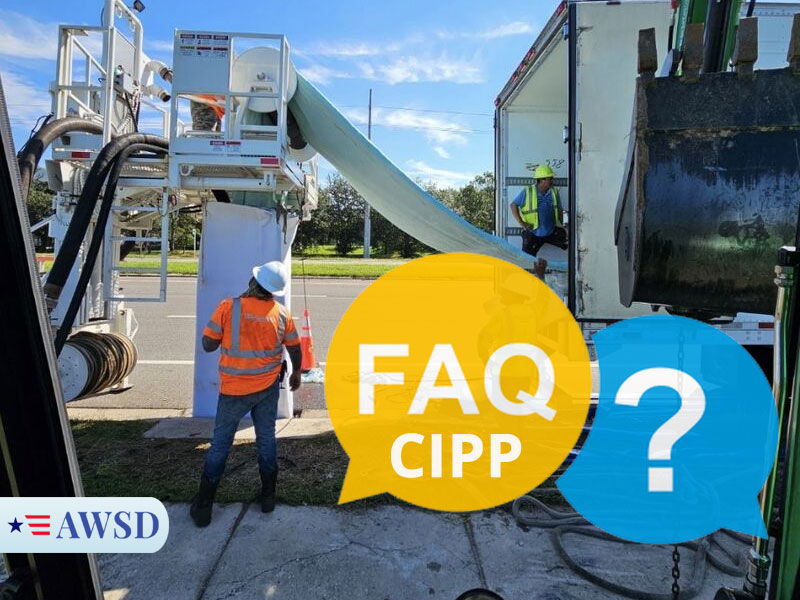
FAQs About Cured-in-Place Pipelining Services in Florida
Overview:
Cured-in-Place Pipelining (CIPP) is a widely used trenchless technology for repairing pipelines, offering a cost-effective and minimally invasive solution for pipeline rehabilitation. In Florida, where aging infrastructure and frequent severe weather can cause significant pipe damage, CIPP services are particularly valuable. Below is an overview of frequently asked questions (FAQs) regarding CIPP services in Florida:
What is Cured-in-Place Pipelining (CIPP)?
CIPP is a trenchless pipe repair method that involves inserting a resin-saturated felt tube into a damaged pipe.
How does the CIPP process work?
1. Inspection: A thorough inspection using a camera is conducted to assess the pipe’s condition.
2. Cleaning: The pipe is cleaned to remove debris and obstructions.
3. Installation: Into the damaged pipe, a resin-saturated liner is inserted.
4. Curing: The liner is inflated and cured using hot water, steam, or UV light, forming a durable new pipe inside the old one.
5. Inspection: A final inspection ensures the integrity of the repair.
Using CIPP what types of pipes can be repaired?
CIPP can be used to repair a variety of pipe materials, including:
· Cast iron
· PVC
· Concrete
· Clay
· Asbestos cement
It is suitable for sewer, stormwater, and potable water pipes.
What are the benefits of CIPP?
· Minimally Invasive: Requires little to no excavation, reducing surface disruption and costs.
· Cost-Effective: Generally cheaper than traditional dig-and-replace methods.
· Quick Installation: Repairs can often be completed in a day or less.
· Durability: Creates a seamless, jointless pipe resistant to corrosion and root intrusion.
How long does CIPP last?
A properly installed CIPP liner can last over 50 years, offering a long-term solution to pipeline issues.
What are the typical costs for CIPP services in Florida?
The cost of CIPP services can vary based on several factors, including:
· Pipe diameter and length
· Condition and location of the pipe
· Access requirements
· Choice of curing method
For CIPP in Florida, are there any specific regulations?
Yes, Florida has regulations and standards for CIPP to ensure quality and safety, including:
· Compliance with ASTM F1216: This standard covers the installation of CIPP.
· Permits and Approvals: Necessary permits must be obtained from local authorities.
· Environmental Considerations: Measures to protect local ecosystems must be followed, especially in sensitive areas like wetlands.
How can I find a reputable CIPP service provider in Florida?
When looking for a CIPP service provider in Florida, consider:
· Certifications: Ensure they comply with industry standards and have relevant certifications.
· Service Guarantee: Ensure they offer a warranty or guarantee for their work.
What are the potential downsides or limitations of CIPP?
While CIPP offers many benefits, it does have some limitations:
· Initial Cost: While generally cost-effective, the initial cost can be high for large-scale projects.
· Accessibility Issues: It may not be feasible for pipes that are difficult to access.
· Chemical Sensitivity: Some concerns about the environmental impact of the chemicals used in the curing process.
Can CIPP be used for emergency repairs?
Yes, CIPP is well-suited for emergency pipe repairs due to its quick installation and minimal disruption.
How does Florida's climate affect CIPP?
Florida’s high humidity and frequent rainfall can affect the curing process, but experienced providers can adjust methods to ensure proper curing and installation. The high groundwater table can also present challenges, but CIPP is effective in managing these conditions.
What maintenance is required after a CIPP installation?
CIPP liners typically require minimal maintenance, but regular inspections are recommended to ensure the integrity of the system and to prevent future issues.
Are there alternatives to CIPP?
Yes, alternatives include pipe bursting, slip lining, and traditional dig-and-replace methods. The best choice depends on specific project requirements, such as pipe condition, location, and budget. For more information or to schedule a consultation with a CIPP specialist in Florida, contact a local trenchless technology service provider. This overview should provide a comprehensive understanding of Cured-in-Place Pipelining services in Florida. If you have any further questions or need specific information, feel free to ask!
Jul 19, 2024